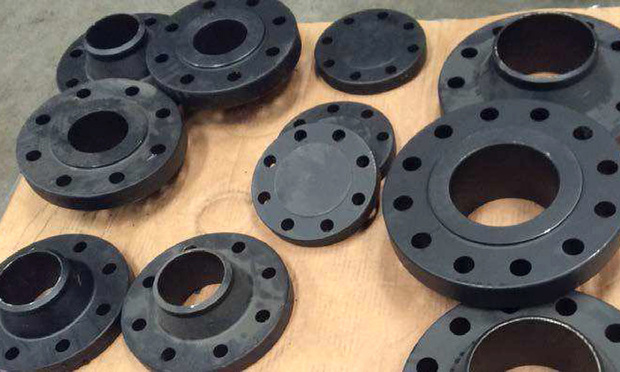Daily Dicta: Top Litigators Battle Over Flanges. Whatever Those Are.
A federal jury in Houston just awarded $31 million to flange makers represented by Norton Rose and Mayer Brown in a false advertising and unfair competition suit.
October 01, 2019 at 07:00 AM
6 minute read
 Flanges
Flanges
Flanges don't get a lot of glory.
They're one of those industrial parts I've vaguely heard of, but probably couldn't pick out in a lineup of, say, gaskets, washers and fittings.
Which is why I did a double-take when I saw flanges were the subject of a new $31 million jury verdict for false advertising and unfair competition. There are flange ads? Did I miss the Super Bowl spot?
It turns out, flanges—which can range in diameter from half an inch to more than eight feet and are used to connect pipes, valves, pumps and other equipment in oil and gas pipelines—are really important.
In a pipeline, a flange's "integrity and compliance with stated specifications can mean the difference between a well-functioning system and a catastrophic failure," wrote lawyers from Norton Rose Fulbright on behalf of flange makers Boltex Manufacturing and Weldbend Corp. in a 2017 suit filed in the Southern District of Texas.
 Along with co-counsel from Mayer Brown, they sued Ulma Piping, a Spain-based flange maker represented by Dechert partners Andrew Levander (named a Litigator of the Year by The American Lawyer in 2017) and Hector Gonzalez, the chair of Dechert's global litigation practice.
Along with co-counsel from Mayer Brown, they sued Ulma Piping, a Spain-based flange maker represented by Dechert partners Andrew Levander (named a Litigator of the Year by The American Lawyer in 2017) and Hector Gonzalez, the chair of Dechert's global litigation practice.
Boltex and Weldbend alleged that the defendants "undersell and unfairly compete with plaintiffs by advertising their flanges as 'normalized,' when they are not."
Normalization, I've now learned, is a big deal in the flange world. It's an industrial heat treatment process that results in a "steel with a more fine-grained homogeneous microstructure and more predictable properties and machinability." But it also makes the product more expensive.
When U.S.-based Boltex and Weldbend saw Ulma offering bargain-priced "normalized" flanges, they got suspicious.
"Something didn't add up," said Norton Rose partner Saul Perloff. After all, Ulma is based in Europe, not Asia. "The steel and labor and energy costs are all about the same" as in the U.S., Perloff noted. How could Ulma be selling normalized flanges so cheaply?
Based on this "seed of suspicion," Perloff said his clients bought some of Ulma's so-called normalized flanges.
They cut them open and had them examined under an electron microscope. Their conclusion: The flanges were not in fact normalized per industry standards and specifications.
"By avoiding the normalization step (and the associated expense), but nonetheless falsely and misleadingly describing their flanges as normalized, defendants can sell their products at a lower price than can plaintiffs," the domestic flange makers alleged.
In court papers, Ulma countered that it uses a proprietary method of heat treatment that's equivalent to normalization, and that all of its flanges "meet both clients' and [industry standard] specifications."
But the plaintiffs argued that wasn't good enough. They questioned whether customers would have bought Ulma's "normalized" flanges if they had known they were manufactured using an alternative method rather than the one laid out by the American Society of Testing and Materials to ensure uniformity in the industry.
The case went to trial on Sept. 16 in Houston federal court, with U.S. District Judge Andrew Hanen presiding.
Mayer Brown's Zarlenga said the plaintiffs had two main themes. The first, hammered home mainly by co-counsel Perloff, was that Ulma did not perform the specific heat treatments required by industry standards to label its flanges as normalized—but nonetheless marketed and advertised them as being compliant.
The second, which Zarlenga stressed, was that after Boltex and Weldbend filed the suit, "Ulma faced a moment of truth." The company had all the information it needed on hand, he alleged, to answer the question of whether or not it had performed the industry-standard normalization treatment.
Ulma's response, Zarlenga said, "was to send a letter from the CEO to all customers denying everything. I shoved that letter down their throat as far as it would go."
After a nine-day trial, the jury sided with Boltex and Weldbend on every question, concluding that Ulma falsely advertised its flanges and engaged in unfair competition.
Norton Rose's trial team also included partner Marc Collier and counsel Kathy Grant and Bob Rouder, with additional support from Minneapolis senior counsel Leaf McGregor and Andre Hanson, Austin senior associate Nathan Damweber, as well as Houston associate Andrea Shannon.
At Mayer Brown, Zarlenga was assisted by associate Michael Lindinger.
The $31 million award is a special verdict, so the judge has extra time to evaluate it before it becomes final.
The bulk of the penalty—$26 million—is disgorgement of profits, which could be an issue.
Levander declined comment, but a spokesman for Ulma pointed to language in the Fifth Circuit's decision in Retractable Technologies, Incorporated v. Becton Dickinson & Co. that might make the award vulnerable.
The appeals court held that in "many cases, disgorgement will not be equitable where few or no sales were ever diverted from the plaintiff to the defendant, because disgorgement in such contexts would grant the plaintiff an unjustified 'windfall.'"
As for the customers who bought Ulma's flanges, it's not clear whether they'll feel compelled to replace the parts—so far, they don't seem inclined to do so, but it's not what you'd call an easy fix—or will take legal action of their own.
Then again, if there was another a Deepwater Horizon-style disaster, how would it look if it came out that the flanges were manufactured using an alternative process?
In other words, this case may not be over yet.
This content has been archived. It is available through our partners, LexisNexis® and Bloomberg Law.
To view this content, please continue to their sites.
Not a Lexis Subscriber?
Subscribe Now
Not a Bloomberg Law Subscriber?
Subscribe Now
NOT FOR REPRINT
© 2025 ALM Global, LLC, All Rights Reserved. Request academic re-use from www.copyright.com. All other uses, submit a request to [email protected]. For more information visit Asset & Logo Licensing.
You Might Like
View All
Litigators of the Week: A $604.9M Trade Secrets Verdict With a Big Assist From a Juror Question

Litigators of the Week: A Reset in the Fight Over Nearly $2B in Bonds Issued by Venezuela's National Oil Company

How Kirkland & Ellis Litigators Became a National Brand in Oil and Gas

Dorsey & Whitney Hits Back Against Complaint Claiming Firm Dragged Its Feet on Malpractice Suit Against Fellow Big Firm
Trending Stories
- 1Pogo Stick Maker Wants Financing Company to Pay $20M After Bailing Out Client
- 2Goldman Sachs Secures Dismissal of Celebrity Manager's Lawsuit Over Failed Deal
- 3Trump Moves to Withdraw Applications to Halt Now-Completed Sentencing
- 4Trump's RTO Mandate May Have Some Gov't Lawyers Polishing Their Resumes
- 5A Judge Is Raising Questions About Docket Rotation
Who Got The Work
J. Brugh Lower of Gibbons has entered an appearance for industrial equipment supplier Devco Corporation in a pending trademark infringement lawsuit. The suit, accusing the defendant of selling knock-off Graco products, was filed Dec. 18 in New Jersey District Court by Rivkin Radler on behalf of Graco Inc. and Graco Minnesota. The case, assigned to U.S. District Judge Zahid N. Quraishi, is 3:24-cv-11294, Graco Inc. et al v. Devco Corporation.
Who Got The Work
Rebecca Maller-Stein and Kent A. Yalowitz of Arnold & Porter Kaye Scholer have entered their appearances for Hanaco Venture Capital and its executives, Lior Prosor and David Frankel, in a pending securities lawsuit. The action, filed on Dec. 24 in New York Southern District Court by Zell, Aron & Co. on behalf of Goldeneye Advisors, accuses the defendants of negligently and fraudulently managing the plaintiff's $1 million investment. The case, assigned to U.S. District Judge Vernon S. Broderick, is 1:24-cv-09918, Goldeneye Advisors, LLC v. Hanaco Venture Capital, Ltd. et al.
Who Got The Work
Attorneys from A&O Shearman has stepped in as defense counsel for Toronto-Dominion Bank and other defendants in a pending securities class action. The suit, filed Dec. 11 in New York Southern District Court by Bleichmar Fonti & Auld, accuses the defendants of concealing the bank's 'pervasive' deficiencies in regards to its compliance with the Bank Secrecy Act and the quality of its anti-money laundering controls. The case, assigned to U.S. District Judge Arun Subramanian, is 1:24-cv-09445, Gonzalez v. The Toronto-Dominion Bank et al.
Who Got The Work
Crown Castle International, a Pennsylvania company providing shared communications infrastructure, has turned to Luke D. Wolf of Gordon Rees Scully Mansukhani to fend off a pending breach-of-contract lawsuit. The court action, filed Nov. 25 in Michigan Eastern District Court by Hooper Hathaway PC on behalf of The Town Residences LLC, accuses Crown Castle of failing to transfer approximately $30,000 in utility payments from T-Mobile in breach of a roof-top lease and assignment agreement. The case, assigned to U.S. District Judge Susan K. Declercq, is 2:24-cv-13131, The Town Residences LLC v. T-Mobile US, Inc. et al.
Who Got The Work
Wilfred P. Coronato and Daniel M. Schwartz of McCarter & English have stepped in as defense counsel to Electrolux Home Products Inc. in a pending product liability lawsuit. The court action, filed Nov. 26 in New York Eastern District Court by Poulos Lopiccolo PC and Nagel Rice LLP on behalf of David Stern, alleges that the defendant's refrigerators’ drawers and shelving repeatedly break and fall apart within months after purchase. The case, assigned to U.S. District Judge Joan M. Azrack, is 2:24-cv-08204, Stern v. Electrolux Home Products, Inc.
Featured Firms
Law Offices of Gary Martin Hays & Associates, P.C.
(470) 294-1674
Law Offices of Mark E. Salomone
(857) 444-6468
Smith & Hassler
(713) 739-1250






